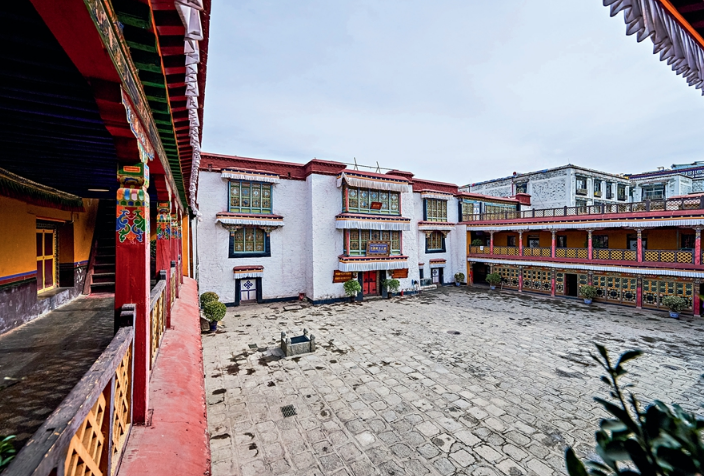New Tales in Old Courtyards
China Today by Lu Mingwen,April 20, 2018 Adjust font size:
Tibetan Medicine in the Old Courtyard
Some ancient shops and courtyards can be found along Dongtsesur Alley at the end of the Barkhor East Street, Niangrongxia is one of them. Housing a clinic and an old-style private school in the past, the building has witnessed generations of outstanding professionals on Tibetan medicine and language.

Rigzin Lhundrup Paljor, founder of Niangrongxia Private School, was born in 1898 in a small village in Tarrong Town of Nyemo County near Lhasa. Three generations before him in his family had been devoted into careers in medicine. After completing his study, Rigzin Lhundrup Paljor established a private school in a courtyard on Barkhor East Street in 1920. In addition to teaching Tibetan calligraphy, he practiced medicine at the same time. As his private school was getting famous, the compound was too small to accommodate the growing number of students, so Rigzin Lhundrup Paljor rented Niangrongxia Courtyard from an aristocratic family named Surkhang.
In this new location, he continued teaching and practicing medicine. To the students and patients with poor economic conditions, Rigzin Lhundrup Paljor never charged any fees. Moreover, he often assisted them with food and money. His benevolence and remarkable medicinal skills were widely known. People showed their respect to him by calling him Mr. Niangrongxia. He eventually handed over the baton to his third daughter, Awa Trinley Paldron, who later grew into a well-known doctor. Although the private school moved to Yuthok Kangqiong Courtyard on the same street in 1954, the honorific title – Mr. Niangrongxia – remained.
Rigzin Lhundrup Paljor passed away in 1978. But his cause has been carried out by his offspring. Tseten Dorje, the son of Awa Trinley Paldron, had been taught Tibetan language and medicine by his grandfather in person for eight years.
Tseten Dorje is in his 50s today. Recalling his childhood, he believes that being kindhearted is the most precious heritage his grandfather left. “Every patient is equal. A doctor should treat them equally no matter they be rich or poor,” Tseten Dorje said.
Pharmacology constitutes an important part of traditional Tibetan medicine. With deep knowledge learnt from his grandfather, Tseten Dorje is good at both giving treatments and making Tibetan medicine. Like his grandfather, he has earned the esteem of locals for his medical skills and ethics.
Although he is addressed as Mr. Niangrongxia like his grandfather, Tseten Dorje has never had any experience relevant to the Niangrongxia Courtyard. But the more he learns about the history of the clinic and the private school, the more frequently he would visit the courtyard – simply to talk with current residents. He often collects stories about the courtyard in newspapers and shows them to residents. As a sixth-generation doctor in his family, Tseten Dorje is determined to carry forward the title of Mr. Niangrongxia and pass on the legend of the undertaking his grandfather initiated.
On the basis of the clinic in Niangrongxia Courtyard, the local residents’ committee established the Barkhor Tibetan Hospital in 1975. At that time, Tseten Dorje was an intern and his mother took charge of the hospital’s management. Over four decades, the hospital has built up a well-deserved reputation and Tseten Dorje has grown into a veteran doctor having cured countless patients. According to his experience, Tibetan medicine has particularly good effects on such diseases as stomach problems, cerebral atrophy, and high blood pressure.
In Tseten Dorje’s office, a letter of appreciation written in English is posted on the wall. It was from a U.S. patient in 2002. “She caught a cold and got altitude sickness during her tour in Lhasa. But I cured her with Tibetan medicine. She sent me the letter after returning to the U.S.,” Tseten Dorje said.

